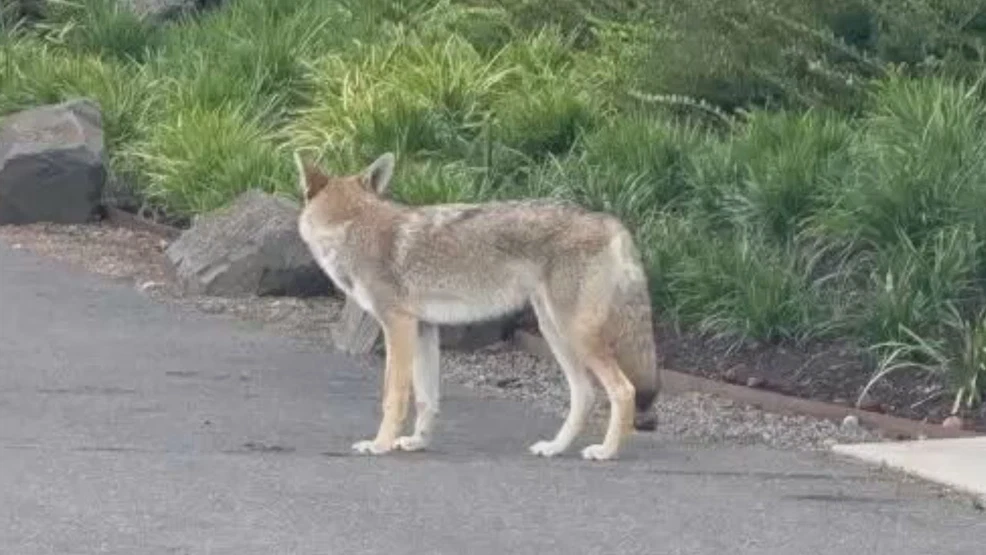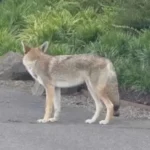PORTLAND, Ore. — A coyote that attacked a 9-year-old child in Portland’s Alameda neighborhood in late October has been captured and humanely euthanized, according to the Oregon Department of Fish & Wildlife (ODFW).
Officials said the incident occurred around 6:15 p.m. on October 23, when two children — ages 9 and 3 — were playing hide-and-seek in their yard. The coyote reportedly approached the 9-year-old and bit the child on the foot. At the time of the attack, the child was wearing only socks. After shaking their foot free from the coyote’s grip, the child ran to safety. Because the bite broke the skin, the child received medical treatment for possible rabies exposure.
Search and Capture Efforts
Following the incident, ODFW began working with local, state, and federal partners to locate and identify the coyote responsible for the attack. After more than a week of monitoring and investigation, wildlife officials captured the animal on October 31, less than a mile from where the attack occurred.
Also Read
To ensure the correct coyote was identified, the department sent both the child’s sock and DNA samples from the captured animal to the California Department of Fish & Wildlife Forensics Lab. The lab confirmed a genetic match between the coyote and the attack evidence, verifying that it was indeed the same animal.
“We are grateful to our partners for their support and assistance in overcoming the challenges of animal capture in an urban area,” said ODFW District Wildlife Biologist Dave Keiter. “Our goal is always to prevent wildlife conflicts from escalating to this point, but in this case, lethal removal was necessary to ensure public safety.”
Ensuring Public Safety
ODFW emphasized that while coyotes are common throughout Oregon, aggressive behavior toward humans is rare. However, officials say human food sources can cause coyotes to lose their natural fear of people, leading to bold or dangerous encounters.
In response to this incident, ODFW has been working to educate Portland residents about coexisting safely with coyotes. The agency also confirmed that the euthanized coyote’s removal was part of a broader effort to restore safety and confidence in the Alameda neighborhood.
“We emphasize outreach and education about living with coyotes in urban areas,” an ODFW statement read. “In this situation, lethal removal was required to restore public safety, and we are satisfied that the animal responsible was identified through genetic evidence.”
Living with Coyotes in Urban Areas
Coyotes are found across Oregon — from rural farmlands and forests to dense urban areas like Portland. They are opportunistic omnivores, feeding mainly on rodents, fruit, and nuts but also scavenging pet food, garbage, and occasionally preying on small pets. Daytime sightings in neighborhoods are not unusual and do not necessarily mean a coyote is sick or aggressive.
To prevent similar incidents, ODFW urges residents to follow several safety guidelines:
-
Remove food sources. Never intentionally or accidentally feed coyotes. Secure trash cans, clean up fallen fruit, and avoid leaving pet food outside.
-
Scare away bold coyotes. If you encounter a coyote that approaches you, make loud noises, wave your arms, or use objects like sticks or rocks to frighten it off.
-
Supervise pets. Keep dogs on a leash and bring cats indoors, especially at night.
-
Watch young children. Always monitor kids playing outside, particularly in areas near parks, green spaces, or wooded lots.
-
Educate your community. Share information on how to coexist safely with wildlife to prevent future conflicts.
A Growing Urban Wildlife Challenge
Wildlife experts say that coyote encounters have become more common as urban development expands into natural habitats. Portland, with its abundance of green spaces and mild climate, provides ideal conditions for coyotes to thrive.
While the Alameda neighborhood incident is a rare case of a direct attack, ODFW hopes it serves as a reminder that human behavior — especially leaving out food or failing to deter bold animals — plays a major role in preventing future problems.
ODFW has since reaffirmed its commitment to balancing wildlife conservation and community safety, noting that education remains the most effective tool to prevent dangerous interactions.











